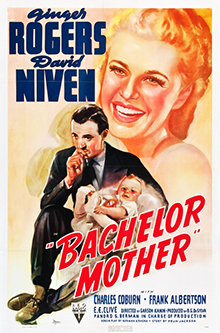
Bachelor Mother (1939) is an American romantic comedy film directed by Garson Kanin, and starring Ginger Rogers, David Niven, and Charles Coburn. The screenplay was written by Norman Krasna from an Academy Award-nominated story by Felix Jackson written for the 1935 Austrian-Hungarian film Little Mother. With a plot full of mistaken identities, Bachelor Mother is a light-hearted treatment of the otherwise serious issues of child abandonment.
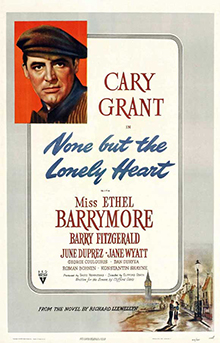
None but the Lonely Heart is a 1944 American drama romance film which tells the story of a young Cockney drifter who returns home with no ambitions but finds that his family needs him. Adapted by Clifford Odets from the 1943 novel of the same title by Richard Llewellyn and directed by Odets, the film stars Cary Grant, Ethel Barrymore, and Barry Fitzgerald.
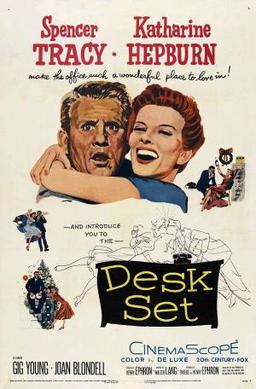
Desk Set is a 1957 American romantic comedy film starring Spencer Tracy and Katharine Hepburn. Directed by Walter Lang, the picture's screenplay was written by Phoebe Ephron and Henry Ephron, adapted from the 1955 play of the same name by William Marchant.

Sleepless in Seattle is a 1993 American romantic comedy film directed by Nora Ephron, from a screenplay she wrote with David S. Ward and Jeff Arch. Starring Tom Hanks and Meg Ryan, the film follows a journalist (Ryan) who becomes enamored with a widowed architect (Hanks), when the latter's son calls in to a talk radio program requesting a new partner for his grieving father. In addition to Bill Pullman, Ross Malinger, and Rob Reiner, the film features Rosie O'Donnell, Gaby Hoffmann, Victor Garber, Rita Wilson, Barbara Garrick, and Carey Lowell.

Nora Ephron was an American journalist, writer, and filmmaker. She is best known for writing and directing romantic comedy films and received numerous accolades including a British Academy Film Award as well as nominations for three Academy Awards, a Golden Globe Award, a Tony Award and three Writers Guild of America Awards.

The Devil and Miss Jones is a 1941 American comedy film directed by Sam Wood and starring Jean Arthur, Robert Cummings, and Charles Coburn. Its plot follows a department store tycoon who goes undercover in one of his Manhattan shops to ferret union organizers, but instead becomes involved in the employees' personal lives.
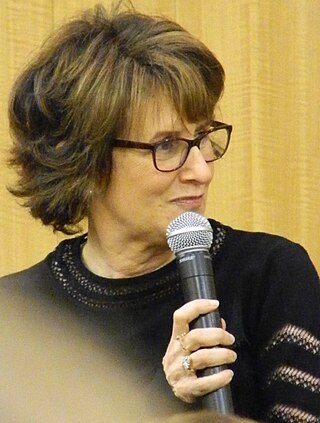
Delia Ephron is an American writer and film producer.
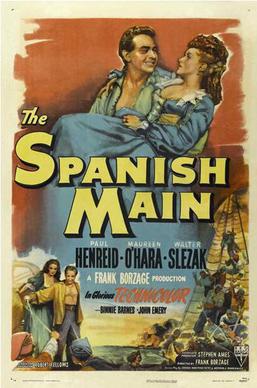
The Spanish Main is a 1945 American adventure film starring Paul Henreid, Maureen O'Hara, Walter Slezak and Binnie Barnes, and directed by Frank Borzage. It was RKO's first all-Technicolor film since Becky Sharp ten years before.
Norman Krasna was an American screenwriter, playwright, producer, and film director who penned screwball comedies centered on a case of mistaken identity. Krasna directed three films during a forty-year career in Hollywood. He garnered four Academy Award screenwriting nominations, winning once for 1943's Princess O'Rourke, which he also directed. Krasna wrote a number of successful Broadway plays, including Dear Ruth and John Loves Mary.

Who Was That Lady? is a 1960 black and white American comedy film directed by George Sidney and starring Tony Curtis, Dean Martin, and Janet Leigh.
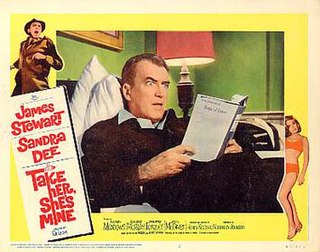
Take Her, She's Mine is a 1963 American comedy film starring James Stewart and Sandra Dee and based on a 1961 Broadway comedy written by the husband-and-wife team of Henry and Phoebe Ephron. The film was directed by Henry Koster with a screenplay written by Nunnally Johnson. It features an early film score by prolific composer Jerry Goldsmith. The character of Mollie, played by Elizabeth Ashley on Broadway and in the film by Dee, was based on the Ephrons' 22-year-old daughter Nora Ephron. The supporting cast features Robert Morley, John McGiver and Bob Denver.
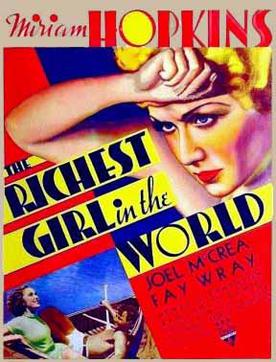
The Richest Girl in the World is a 1934 American romantic comedy film directed by William A. Seiter and starring Miriam Hopkins, Joel McCrea and Fay Wray. Norman Krasna was nominated for the Academy Award for Best Story. It was remade in 1944 as Bride by Mistake with Laraine Day and Alan Marshal.
Henry Ephron was an American playwright, screenwriter and film producer who often worked with his wife, Phoebe. He was active as a writer from the early 1940s through the early 1960s.
Phoebe Ephron was an American playwright and screenwriter, who often worked with Henry Ephron, her husband, whom she wed in 1934.

Princess O'Rourke is a 1943 American romantic comedy film directed and written by Norman Krasna, and starring Olivia de Havilland, Robert Cummings and Charles Coburn. Krasna won the 1944 Oscar for Best Original Screenplay.

Alan Marshal was an Australian-born actor who performed on stage in the United States and in Hollywood films. He was sometimes billed as Alan Marshall or Alan Willey.

Parole Girl is a 1933 American pre-Code romantic drama film directed by Edward Cline. The film stars Mae Clarke and Ralph Bellamy.
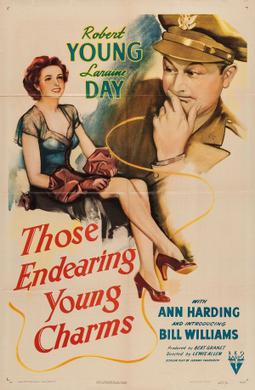
Those Endearing Young Charms is a 1945 American comedy film directed by Lewis Allen and written by Edward Chodorov from his play of the same name and starring Robert Young, Laraine Day, Ann Harding, Bill Williams and Marc Cramer.

The Trial of Mary Dugan is a 1941 American drama thriller film directed by Norman Z. McLeod and starring Laraine Day, Robert Young, Tom Conway, Frieda Inescort, John Litel and Marsha Hunt. The screenplay was written by Bayard Veiller based on his 1927 play of the same name. It had previously been made as a 1929 MGM movie starring Norma Shearer in her first all-talking role. There are significant differences in the two movie versions. The 1941 remake was released on February 14, 1941, by Metro-Goldwyn-Mayer.
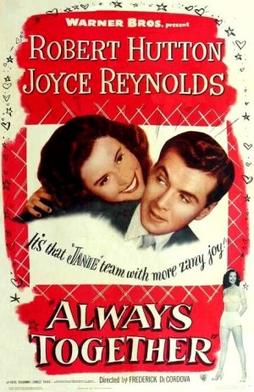
Always Together is a 1947 American comedy film directed by Frederick de Cordova and written by I. A. L. Diamond, Henry Ephron and Phoebe Ephron. The film stars Robert Hutton, Joyce Reynolds, Cecil Kellaway, Ernest Truex, Don McGuire and Ransom M. Sherman. The film was released by Warner Bros. on December 10, 1947.

















